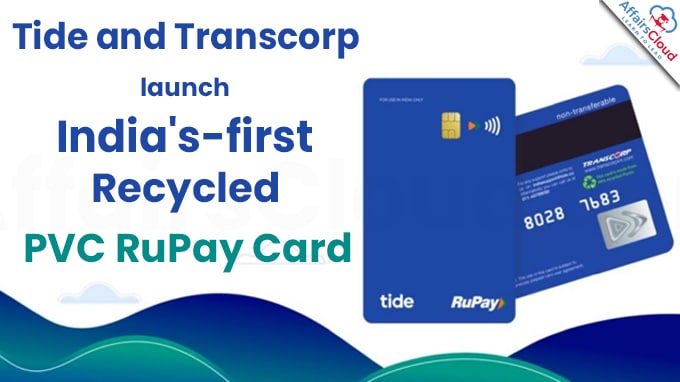 Tide, United Kingdom-based fintech, in partnership with Transcorp International Limited, launched India’s first recycled Polyvinyl Chloride (rPVC) Rupay card, along with MCT Cards & Technology Pvt. Ltd. and NPCI (National Payments Corporation of India).
Tide, United Kingdom-based fintech, in partnership with Transcorp International Limited, launched India’s first recycled Polyvinyl Chloride (rPVC) Rupay card, along with MCT Cards & Technology Pvt. Ltd. and NPCI (National Payments Corporation of India).
- PVC cards are more durable than paper-based cards and can last longer without getting damaged or torn, along with security features.
- rPVC Rupay cards are made from recycled PVC plastic. Every 99% rPVC card weighing 5.5-6 grams, saves on 7-8 grams of CO2 emissions and 3.5-4.0 grams of plastic waste, which will be used in the production of a new card made with virgin PVC.
Industry First Initiative:
With this launch, all the 4 entities initiated industry-first initiatives as part of an India-wide and global shift away from virgin plastic and accelerate reduction in carbon emissions.
- The move is also on the lines of Tide’s commitment to becoming a more sustainable company, by reaching Net Zero simpler for customers in India, and globally. Made from 99% recycled plastic, this is the first such move by a fintech company in India.
Formation of rPVC Cards:
Open Loop Recycling Process: The rPVC cards undergo an open loop recycling process which means that old products, like plastic cards, are transformed into new ones, thereby reducing industrial plastic waste through recycling and reusing.
Material Approval: The material used for producing Tide’s rPVC cards is approved by global testing agencies, including Intertek. The material is also compliant with GRS 4.0 (Global Recycling Standards). These certifications ensure its high-quality and sustainability standards.
- rPVC cards significantly reduce the amount of virgin plastic used and contribute to reducing carbon emissions.
Stringent Testing: All Tide rPVC cards are thoroughly tested for various parameters. These tests include assessing ink adhesion, wrappage, bending, and stress tolerance. The cards are compliant with ISO (International Organization for Standardization) standards. It also undergo a certification process by CIPET (Central Institute of Plastics Engineering & Technology), for quality and sustainability.
Sustainability Badge: Each rPVC card carries a sustainability badge on the reverse side as an educational tool for customers, informing them that the card is made from recycled plastic.
About Tide:
Tide is the United Kingdom’s (UK) leading SME-focused business financial platform. In March 2023, Tide became the first fintech in the world to remove 100% of its emissions with durable carbon removals as of 2022 onwards. To deal with the devastating impacts of climate change, it has made three pledges:
- Pledge 1: Removing 100% of our emissions with durable carbon removal from 2022 onwards.
- Pledge 2: To reduce 90% of 2021 emissions per employee by 2030. Pledges 1 and 2 will make Tide fully Net Zero by 2030.
- Pledge 3: Tide Member NetZero – Tide commits to making Net Zero simpler for itsMembers by developing support for them to get to NetZero.
The CEO (Chief Executive Officer) for Tide (India) is Gurjodhpal Singh.
Recent Related News:
i.City Union Bank (CUB), a private sector lender, has announced the launch of its first-ever credit card service, the “Dhi CUB Visa Signature Credit Card,” in collaboration with 42 Card Solutions Pvt Ltd, a provider of credit card management services.
ii.State Bank of India, an Indian multinational public sector bank, completed its 1st non-dollar transaction with Sri Lanka by paying for exports in Sri Lankan rupees to bring countries that lack US (United States)dollars into the trade mechanism.
About Transcorp International Limited:
It is a Reserve Bank of India (RBI) regulated Prepaid Payment Instrument (PPI) license holder.
Managing Director– Gopal Sharma
Headquarters– New Delhi, Delhi




